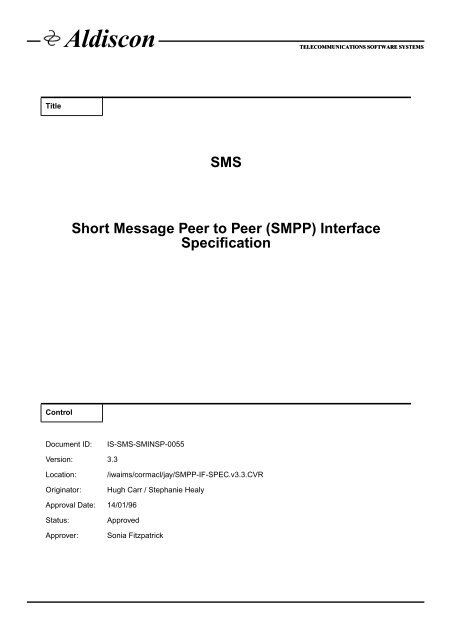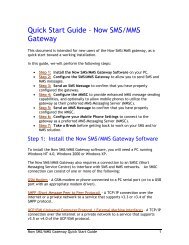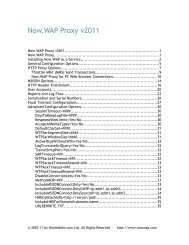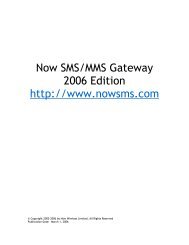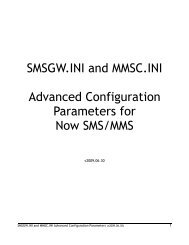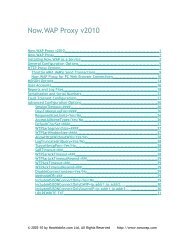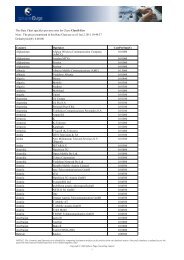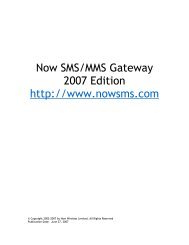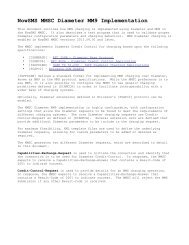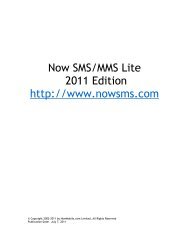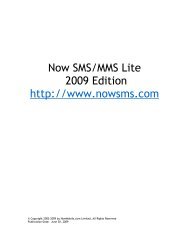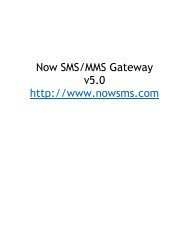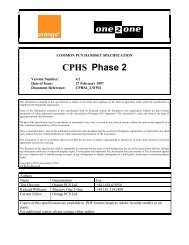SMPP IF Spec V3.3 - OpenSmpp
SMPP IF Spec V3.3 - OpenSmpp
SMPP IF Spec V3.3 - OpenSmpp
You also want an ePaper? Increase the reach of your titles
YUMPU automatically turns print PDFs into web optimized ePapers that Google loves.
Aldiscon<br />
TELECOMMUNICATIONS SOFTWARE SYSTEMS<br />
Title<br />
SMS<br />
Short Message Peer to Peer (<strong>SMPP</strong>) Interface<br />
<strong>Spec</strong>ification<br />
Control<br />
Document ID:<br />
IS-SMS-SMINSP-0055<br />
Version: 3.3<br />
Location:<br />
Originator:<br />
/iwaims/cormacl/jay/<strong>SMPP</strong>-<strong>IF</strong>-SPEC.v3.3.CVR<br />
Hugh Carr / Stephanie Healy<br />
Approval Date: 14/01/96<br />
Status:<br />
Approver:<br />
Approved<br />
Sonia Fitzpatrick
Aldiscon<br />
TELECOMMUNICATIONS SOFTWARE SYSTEMS<br />
Abstract<br />
This document specifies a generalized interface between an SMSC and non-PLMN SMEs.<br />
Distribution John Mac Ardle Aidan Boran Miriam Bennett<br />
Rory Mac Hale Jim Noctor Cathal Fitzpatrick Phil O’ Neill<br />
Sonia Fitzpatrick Neill Gallagher Laura McQuillan Adam Cowan<br />
History<br />
3.0 H.C. 28/11/94 First Approved Version<br />
3.1 S.H. 30/11/95 New Requirements added<br />
3.2 S.H. 11/12/95 Review amendments added<br />
3.3 S.H. 14/01/96 <strong>SMPP</strong> Provisioning Guides modified<br />
Whilst the greatest care has been taken to ensure the accuracy of the information contained herein, Aldiscon Limited does not warrant<br />
the accuracy of same. Aldiscon expressly disclaim all and any liability to any person, whether a purchaser of the publication or not, in
Short Message Peer to Peer (<strong>SMPP</strong>) Interface <strong>Spec</strong>ification<br />
Table of Contents<br />
1. Introduction....................................................................................................................................3<br />
1.1 Purpose ..............................................................................................................................3<br />
1.2 Scope..................................................................................................................................3<br />
1.3 References .........................................................................................................................3<br />
1.4 Glossary..............................................................................................................................4<br />
2. Functional overview ......................................................................................................................5<br />
2.1 ESMEs to SMSC ................................................................................................................5<br />
2.2 SMSC to ESME ..................................................................................................................6<br />
2.3 Backward Compatibility. .....................................................................................................6<br />
3. Interface <strong>Spec</strong>ification ..................................................................................................................7<br />
4. Protocol Messages........................................................................................................................8<br />
5. Use of Primitives ...........................................................................................................................9<br />
5.1 Initiation of Communication with SMSC..............................................................................9<br />
5.2 Steady-State Communication with the SMSC ..................................................................10<br />
5.3 Terminating Communication with the SMSC....................................................................10<br />
5.4 Error Handling and Retransmission..................................................................................10<br />
5.5 Protocol Message Types ..................................................................................................11<br />
5.5.1 ESME to SMSC ...............................................................................................11<br />
5.5.2 SMSC to ESME ...............................................................................................13<br />
6. Message Layouts.........................................................................................................................15<br />
6.1 Definitions.........................................................................................................................15<br />
6.2 Message Header Format..................................................................................................16<br />
6.2.1 “GENERIC_NAK” Command ...........................................................................16<br />
6.2.1.1 “GENERIC_NAK” Syntax...........................................................16<br />
6.3 Message Body Formats....................................................................................................17<br />
6.3.1 “BIND” Operation ............................................................................................17<br />
6.3.1.1 “BIND_RECEIVER” Syntax .......................................................18<br />
6.3.1.2 “BIND_RECEIVER_RESP” Syntax............................................18<br />
6.3.1.3 “BIND_TRANSMITTER” Syntax ................................................19<br />
6.3.1.4 “BIND_TRANSMITTER_RESP” Syntax ....................................19<br />
6.3.2 “UNBIND” Operation........................................................................................19<br />
6.3.2.1 “UNBIND” Syntax......................................................................19<br />
6.3.2.2 “UNBIND_RESP” Syntax..........................................................19<br />
6.3.3 “SUBMIT_SM” Operation................................................................................20<br />
6.3.3.1 “SUBMIT_SM” Syntax ...............................................................20<br />
6.3.3.2 “SUBMIT_SM_RESP” Syntax....................................................22<br />
6.3.4 “SUBMIT_MULTI” Operation ...........................................................................23<br />
6.3.4.1 “SUBMIT_MULTI_RESP” Syntax ..............................................25<br />
6.3.5 “DELIVER_SM” Operation...............................................................................26<br />
6.3.5.1 “DELIVER_SM” Syntax..............................................................26<br />
6.3.5.2 “DELIVER_SM_RESP” Syntax..................................................26<br />
6.3.6 QUERY ............................................................................................................27<br />
6.3.6.1 “QUERY_SM” Operation ...........................................................27<br />
6.3.6.2 “QUERY_SM” Syntax ...............................................................27<br />
6.3.6.3 “QUERY_SM_RESP” Syntax ....................................................28<br />
6.3.6.4 “QUERY_LAST_MSGS” Operation ...........................................29<br />
6.3.6.5 “QUERY_LAST_MSGS” Syntax ................................................29<br />
6.3.6.6 “QUERY_LAST_MSGS_RESP” Syntax ....................................29<br />
6.3.6.7 “QUERY_MSG_DETAILS” Operation........................................31<br />
6.3.6.8 “QUERY_MSG_DETAILS” Syntax ............................................31<br />
©Aldiscon Limited<br />
IS-SMS-SMINSP-0055 Version 3.3 1 of 46
Short Message Peer to Peer (<strong>SMPP</strong>) Interface <strong>Spec</strong>ification<br />
6.3.6.9 “QUERY_MSG_DETAILS_RESP” Syntax.................................31<br />
6.3.7 “CANCEL_SM” Operation................................................................................34<br />
6.3.7.1 “CANCEL_SM” Syntax ..............................................................34<br />
6.3.7.2 “CANCEL_SM_RESP” Syntax...................................................35<br />
6.3.8 “REPLACE_SM” Operation .............................................................................36<br />
6.3.8.1 “REPLACE_SM” Syntax ............................................................36<br />
6.3.8.2 “REPLACE_SM_RESP” Syntax ................................................37<br />
6.3.9 “ENQUIRE_LINK” Operation ...........................................................................38<br />
6.3.9.1 “ENQUIRE_LINK” Syntax ..........................................................38<br />
6.3.9.2 “ENQUIRE_LINK_RESP” Syntax ..............................................38<br />
6.3.10 “PARAM_RETRIEVE” Operation.....................................................................38<br />
6.3.10.1 “PARAM_RETRIEVE” Syntax....................................................38<br />
6.3.10.2 “PARAM_RETRIEVE_RESP” Syntax........................................38<br />
7. System Definitions ......................................................................................................................39<br />
7.1 Error Codes ......................................................................................................................39<br />
7.2 Command I.D. Values.......................................................................................................41<br />
7.3 Error Codes ......................................................................................................................43<br />
7.3.1 GSM Error Codes ............................................................................................43<br />
7.3.2 SMSC Error Codes ..........................................................................................43<br />
7.4 Message States................................................................................................................44<br />
7.5 Time Format .....................................................................................................................45<br />
©Aldiscon Limited<br />
IS-SMS-SMINSP-0055 Version 3.3 2 of 46
Short Message Peer to Peer (<strong>SMPP</strong>) Interface <strong>Spec</strong>ification<br />
Introduction<br />
1. Introduction<br />
1.1 Purpose<br />
This document specifies a generalized interface between an SMSC and non-PLMN SMEs. Typically it<br />
specifies the interface used between the SMSC and Paging or VoiceMail systems. The command format<br />
defines a Short Message Peer to Peer Protocol (hereafter referred to as <strong>SMPP</strong>). This protocol may be<br />
implemented over a variety of underlying interfaces/communications protocols, namely X.25, or TCP/IP.<br />
Using this interface, an external Short Message Entity such as a Paging or VoiceMail system may bind/<br />
unbind to the SMSC, submit , cancel, replace and query short messages. The SMSC forwards responses<br />
and short messages (e.g delivery receipts, pager messages) to the external Short Message Entity.<br />
1.2 Scope<br />
This document is intended for designers and implementers of the interface between an SMSC and SMEs<br />
(Short Message Entities).<br />
1.3 References<br />
[1] <strong>SMPP</strong> Applications Guide Version 1.3 Aldiscon Limited<br />
[2] Technical Realisation of the Short<br />
Message Service Point to Point,<br />
GSM 03.40<br />
[3] <strong>SMPP</strong> Provisioning Interface<br />
Guide<br />
[4] <strong>SMPP</strong> Provisioning Application<br />
Guide<br />
Version: 4.6.0<br />
Version 1.1<br />
Version 1.1<br />
European Telecommunications<br />
Standards Institute. (ETSI)<br />
Aldiscon Limited<br />
Aldiscon Limited<br />
IS-SMS-SMINSP-0055 Version 3.3 3 of 47<br />
47
Short Message Peer to Peer (<strong>SMPP</strong>) Interface <strong>Spec</strong>ification<br />
Introduction<br />
1.4 Glossary<br />
ACK<br />
Acknowledgement<br />
AIM<br />
Application Interface Module<br />
API<br />
Application Programming Interface<br />
CDR<br />
Call Detail Record<br />
ESME External Short Message Entity. Refer to note[1]<br />
MB<br />
Message Bureau - This is typically an operator message bureau.<br />
MSC Mobile Switching Centre<br />
MS<br />
Mobile Station<br />
NAK<br />
Negative Acknowledgement<br />
SME<br />
Short Message Entity<br />
SMSC Short Message Service Centre<br />
<strong>SMPP</strong> Short Message Peer to Peer Protocol<br />
VC Virtual Connection. Refer to note [2]<br />
VMA<br />
VoiceMail Alert or Message Waiting Indication (MWI)<br />
VPS<br />
Voice Processing System<br />
Note 1<br />
Note 2<br />
External Short Message Entity. In the context of this document this refers to such external sources<br />
and sinks of short messages as Voice Processing or Message Handling computers. It specifically<br />
excludes SMEs which are part of the interface to the PLMN.<br />
Virtual Connection. This refers to a virtual circuit in the X.25 implementation.<br />
IS-SMS-SMINSP-0055 Version 3.3 4 of 47<br />
47
Short Message Peer to Peer (<strong>SMPP</strong>) Interface <strong>Spec</strong>ification<br />
Functional overview<br />
2. Functional overview<br />
Interworking between the SMSC and ESMEs are categorised as:<br />
• (protocol) messages from ESMEs to the SMSC, and<br />
• (protocol) messages from SMSC to ESMEs.<br />
Figure 2.1 illustrates these categories which are detailed in the following sections.<br />
• Messages (to MS)<br />
• Status Query (Opt)<br />
• Acks<br />
ESME-001 (e.g. MB)<br />
X.25 Network<br />
ESME-002 (e.g. VPS)<br />
SMSC<br />
ESME-003 (e.g. MB)<br />
• Messages (to ESME)<br />
• Query Reply,<br />
• Registered Receipt<br />
• Acks<br />
Figure 2-1: SMSC & ESME Interworking using X.25<br />
2.1 ESMEs to SMSC<br />
Subscribers to a GSM Network may receive short messages from ESMEs. The means whereby these<br />
messages are originally generated within or are submitted to the ESME is beyond the scope of this<br />
document, but the following are possible examples:<br />
• Calls directly dialled or diverted to a Message Bureau operator and forwarded to the SMSC.<br />
• Messages originated from terminals at a corporate customer’s site.<br />
• Voice-Mail Alerts originating for a VPS indicating voice messages at a customer’s mailbox.<br />
Messages that are submitted to the SMSC by an ESME are immediately acknowledged. This<br />
acknowledgment informs the ESME that the message submitted is a valid message (i.e. fields are set to<br />
valid values).<br />
IS-SMS-SMINSP-0055 Version 3.3 5 of 47<br />
47
Short Message Peer to Peer (<strong>SMPP</strong>) Interface <strong>Spec</strong>ification<br />
Functional overview<br />
In addition to “Message Submission”, an ESME may “Query” the SMSC for the status of previously<br />
submitted messages, or cancel delivery of previously submitted messages using the Message ID returned<br />
by the SMSC when the particular message was originally submitted.<br />
2.2 SMSC to ESME<br />
The SMSC can deliver short messages to the ESME. A typical example would be the SMSC sending short<br />
messages to an MB for onward delivery as pager messages.<br />
In addition the SMSC may use the “deliver short message” mechanism to generate a “Delivery Receipt”.<br />
(See <strong>SMPP</strong> Applications guide [1] for details).<br />
2.3 Backward Compatibility.<br />
Where changes have occurred in the Interface <strong>Spec</strong>ification between versions, the “interface_version”<br />
provided in the “Bind” primitive is used to discriminate between version numbers for backward compatibility.<br />
IS-SMS-SMINSP-0055 Version 3.3 6 of 47<br />
47
Short Message Peer to Peer (<strong>SMPP</strong>) Interface <strong>Spec</strong>ification<br />
Interface <strong>Spec</strong>ification<br />
3. Interface <strong>Spec</strong>ification<br />
The interface between the SMSC and ESME may be based on X.25, or TCP/IP. For details of a particular<br />
implementation refer to the <strong>SMPP</strong> Applications Guide [1].<br />
The interface between the SMSC and the ESMEs regardless of the underlying network type will be a clientserver<br />
model, in which, the SMSC has the server role and the ESME the client role. In the remainder of this<br />
document, “client” is referred to the system that initiates a connection and “server” is referred to the system<br />
that services a connection.<br />
Note that this document specifies the interface at the network layer. However, this interface may be<br />
implemented over the transport layer. Figure 3.1 provides a perspective on the scope of this document:<br />
Request/Response<br />
Primitives<br />
Network User<br />
(i.e. SMSC, VPS, MB)<br />
Network Provider (e.g. X.25)<br />
Indication/Confirm<br />
Primitives<br />
Figure 3-1:<br />
Model of SMSC-ESME Interface<br />
IS-SMS-SMINSP-0055 Version 3.3 7 of 47<br />
47
Short Message Peer to Peer (<strong>SMPP</strong>) Interface <strong>Spec</strong>ification<br />
Protocol Messages<br />
4. Protocol Messages<br />
All messages sent, either from ESME to SMSC, or SMSC to ESME, will generate immediate responses.<br />
As previously mentioned, a message submitted from an ESME to SMSC can generate up to two responses.<br />
These are:<br />
• an application level “resp”, and<br />
• where the message was submitted to the SMSC with the registered delivery flag set, a status report<br />
generated after the submitted short message reaches its final state.<br />
Figure 4.1 depicts a possible sequence of these messages (e.g for an X.25 or TCP/IP based<br />
implementation).<br />
ESME<br />
SMSC<br />
submit_sm (1)<br />
submit_sm_resp(1)<br />
deliver_sm(1)<br />
deliver_sm_resp (1)<br />
submit_sm (2)<br />
submit_sm_resp(2)<br />
Figure 4.1 Sample Message Sequence<br />
For details of ESME/SMSC protocol message sequences refer to the <strong>SMPP</strong> Applications Guide[1].<br />
IS-SMS-SMINSP-0055 Version 3.3 8 of 47<br />
47
Short Message Peer to Peer (<strong>SMPP</strong>) Interface <strong>Spec</strong>ification<br />
Use of Primitives<br />
5. Use of Primitives<br />
This section describes an overview of the mechanism for exchange of primitives between the ESME and<br />
SMSC. For details for a particular network implementation, such as X.25 or TCP/IP, see the <strong>SMPP</strong><br />
Applications guide [1].<br />
5.1 Initiation of Communication with SMSC<br />
The ESME establishes communication with the SMSC, by an implementation specific mechanism (see<br />
<strong>SMPP</strong> Applications guide [1]).<br />
Two 'virtual connections’ are required. One will be used for messages originating in the ESME system, and<br />
the response messages for them. (e.g. submit_sm, query_sm, cancel_sm etc.), while the other will be used<br />
for messages originating in the SMSC and their responses (e.g. deliver_sm).<br />
Once a 'virtual connection' has been established, each of the two processes on the ESME should send<br />
either a Bind-Transmitter request or a Bind-Receiver request. If a Bind Transmitter request is sent, the<br />
process on the SMSC that receives it will receive messages originating in the ESME system. If a Bind<br />
Receiver request is sent, the process on the SMSC that receives it will forward messages to the ESME.<br />
Responses will invariably be returned on the same 'virtual connection' as the corresponding request<br />
messages.<br />
The following diagram illustrates this:<br />
ESME<br />
virtual connections<br />
Communications<br />
Provider<br />
e.g. X.25, TCP/IP<br />
SMSC Application<br />
(bound as Transmitter)<br />
SMSC Application<br />
(bound as Receiver)<br />
SMSC Kernel<br />
Figure 5-1:<br />
ESME/SMSC Communication<br />
IS-SMS-SMINSP-0055 Version 3.3 9 of 47<br />
47
Short Message Peer to Peer (<strong>SMPP</strong>) Interface <strong>Spec</strong>ification<br />
Use of Primitives<br />
5.2 Steady-State Communication with the SMSC<br />
Once a connection has been established and an authenticated ‘bind’ request has been acknowledged,<br />
further requests/responses can be exchanged. A response will be issued for each request.<br />
5.3 Terminating Communication with the SMSC<br />
If, at any time, either the ESME or the SMSC needs to terminate communications with the other, it should<br />
issue an “unbind” request over the appropriate ‘virtual connection’. This enables the receiving system to<br />
break communications in an orderly fashion. For both ‘virtual connections’, the unbind request should be<br />
acknowledged by the receiving system before the ‘virtual connection’ is closed.<br />
5.4 Error Handling and Retransmission<br />
On receipt of a message the receiving system will ensure that the message type is valid, and then check,<br />
where appropriate, the validity of the fields of the message body. If the message type or the values of the<br />
fields are incorrect an error code indicating this will be returned in the response message to the originator.<br />
A table of error and status codes can be found in Section 7.1<br />
Should an error be generated by the underlying communication network or the application being used on<br />
the host machine it is the responsibility of the sender of the message to retransmit to the destination. The<br />
originator should maintain a retry count and when this limit has been reached on a single message attempt<br />
the connection should be closed. The ESME should attempt to re-connect. The re-connect method will be<br />
the same as the startup protocol.<br />
The Sequence number in the message header should be generated by the ESME. This number should be<br />
incremented monotonically with each new transaction. This field will be preserved by the receiving system<br />
and returned in the acknowledgement message. This allows for transaction mapping and the detection of<br />
duplicate messages.<br />
IS-SMS-SMINSP-0055 Version 3.3 10 of 47<br />
47
Short Message Peer to Peer (<strong>SMPP</strong>) Interface <strong>Spec</strong>ification<br />
Use of Primitives<br />
5.5 Protocol Message Types<br />
The following message types are supported by the <strong>SMPP</strong>. The “command id” field of the protocol message<br />
is set to specify the particular message.<br />
The detailed formats of these messages are defined in Section [6.].<br />
5.5.1 ESME to SMSC<br />
The following messages are sent from the ESME to the SMSC<br />
Command ID<br />
bind_receiver<br />
bind_transmitter<br />
unbind<br />
submit_sm<br />
submit_multi<br />
deliver_sm_resp<br />
query_sm<br />
query_last_msgs<br />
query_msg_details<br />
cancel_sm<br />
replace_sm<br />
Table 5-1:<br />
Description<br />
This command is issued by the ESME to inform the<br />
SMSC that this ESME wishes to act as a Server<br />
This command is issued by the ESME to inform the<br />
SMSC that this ESME wishes to act as a Client<br />
This command is issued by the ESME to inform the SMSC<br />
that this ESME wishes to terminate its activities.<br />
This command is issued by the ESME to submit a short<br />
message to the SMSC for transmission to a specified subscriber.<br />
This command is issued by the ESME to submit a short<br />
message to the SMSC for transmission to a specified subscriber<br />
or Distribution List or Multiple Recipients.<br />
This command is issued by the ESME to acknowledge the<br />
receipt of a deliver_sm.<br />
This command is issued by the ESME to query the status<br />
of a previously submitted Short Message.<br />
This command is issued by the ESME to query the message<br />
ids of a number of messages in the system for a subscribers<br />
originating address.<br />
This command is issued by the ESME to query all aspects<br />
of a previously submitted Short Message.<br />
This command is issued by the ESME to cancel one or<br />
more outstanding short messages for a subscriber. The<br />
command may specify a particular message or all messages<br />
for a particular source and destination.<br />
This command is issued by the ESME to replace an outstanding<br />
short message for a subscriber.<br />
Message Types from ESME to SMSC.<br />
IS-SMS-SMINSP-0055 Version 3.3 11 of 47<br />
47
Short Message Peer to Peer (<strong>SMPP</strong>) Interface <strong>Spec</strong>ification<br />
Use of Primitives<br />
enquire_link<br />
enquire_link_resp<br />
generic_nak<br />
Table 5-1:<br />
Enquires whether the ESME-SMSC session is functioning,<br />
and thereby provides a link confidence-check.<br />
Response to an “enquire link” previously sent by the SM-<br />
SC.<br />
Generic response to a command for which the message<br />
header is invalid.<br />
Message Types from ESME to SMSC.<br />
IS-SMS-SMINSP-0055 Version 3.3 12 of 47<br />
47
Short Message Peer to Peer (<strong>SMPP</strong>) Interface <strong>Spec</strong>ification<br />
Use of Primitives<br />
5.5.2 SMSC to ESME<br />
The following messages are sent from the SMSC to the ESME.<br />
Command ID<br />
bind_transmitter_resp<br />
bind_receiver_resp<br />
unbind_resp<br />
submit_sm_resp<br />
submit_multi_resp<br />
deliver_sm<br />
query_sm_resp<br />
query_last_msgs_resp<br />
query_msg_details_resp<br />
Table 5-2:<br />
Description<br />
Response to “bind_transmitter”.<br />
Messages submitted with this command id will contain a<br />
status indicating success or failure of the corresponding<br />
“bind_transmitter”.<br />
Response to “bind_receiver”.<br />
Messages submitted with this command id will include a<br />
status indicating success or failure of the corresponding<br />
“bind_receiver”.<br />
Response to “unbind”.<br />
Messages submitted with this command id will include a<br />
status indicating success or failure of the corresponding<br />
“unbind”.<br />
Response indicating that a short message has been accepted<br />
successfully or not. Messages submitted with this command<br />
id will include the status indicating success or<br />
failure of the corresponding “submit_sm”.<br />
Response indicating that a short message has been accepted<br />
successfully or not. Messages submitted with this command<br />
id will include the status indicating success or<br />
failure of the corresponding “submit_multi”.<br />
This command is issued by the SMSC to submit a short<br />
message to the ESME for delivery. It may also be used to<br />
return a delivery receipt for a message which had been<br />
submitted with the delivery receipt flag set.<br />
Response to “query_sm”.<br />
Messages submitted with this command id will include<br />
the status indicating success or failure of the corresponding<br />
“query_sm” in addition to data relating to the queried<br />
message.<br />
Response to “query_last_msgs”.<br />
Messages submitted with this command id will include the<br />
status indicating success or failure of the corresponding<br />
“query_last_msgs” in addition to data relating to the queried<br />
messages.<br />
Response to “query_msg_details”.<br />
Messages submitted with this command id will include the<br />
status indicating success or failure of the corresponding<br />
“query_msg_details” in addition to data relating to the<br />
queried message.<br />
Message Types from SMSC to ESME<br />
IS-SMS-SMINSP-0055 Version 3.3 13 of 47<br />
47
Short Message Peer to Peer (<strong>SMPP</strong>) Interface <strong>Spec</strong>ification<br />
Use of Primitives<br />
cancel_sm_resp<br />
replace_sm_resp<br />
enquire_link<br />
enquire_link_resp<br />
generic_nak<br />
Table 5-2:<br />
Response to “cancel_sm”.<br />
Messages submitted with this command id will include the<br />
status indicating success or failure of the corresponding<br />
“cancel_sm”.<br />
Response to “replace_sm”.<br />
Messages submitted with this command id will include the<br />
status indicating success or failure of the corresponding<br />
“replace_sm”.<br />
Enquires whether the SMSC-ESME session is functioning,<br />
and thereby provides a link confidence-check.<br />
Response to “enquire_link”.<br />
Messages submitted with this command id will include the<br />
status indicating success or failure of the corresponding<br />
“enquire_link”.<br />
Generic response to a command for which the message<br />
header is invalid.<br />
Message Types from SMSC to ESME<br />
IS-SMS-SMINSP-0055 Version 3.3 14 of 47<br />
47
Short Message Peer to Peer (<strong>SMPP</strong>) Interface <strong>Spec</strong>ification<br />
Message Layouts.<br />
6. Message Layouts.<br />
The general format of all protocol messages exchanged between the ESME and the SMSC will consist of<br />
a message header followed by a message body.<br />
6.1 Definitions<br />
In the following descriptions the following definitions will be used:<br />
Integer • a signed value with the defined number of bytes<br />
The bytes will always be transmitted MSB first<br />
C-Octet String • a series of ASCII characters terminated with the NUL<br />
character.<br />
C-Octet String<br />
(Decimal)<br />
C-Octet String<br />
(Hex)<br />
• a series of ASCII characters terminated with the NUL<br />
character.<br />
The octet string should represent a sequence of decimal<br />
digits<br />
• a series of ASCII characters terminated with the NUL<br />
character.<br />
The octet string should represent a sequence of<br />
hexadecimal digits<br />
Octet String • Series of octets which may/may not be null terminated.<br />
The octets themselves can contain nulls.<br />
Where reference is made below to NULL settings of Octet-String fields this implies that the field consists of<br />
a single NUL character, i.e. an Octet encoded with value zero.<br />
Where reference is made to NULL settings of Integer fields this implies that the field is unused and can be<br />
set to 0.<br />
IS-SMS-SMINSP-0055 Version 3.3 15 of 47<br />
47
Short Message Peer to Peer (<strong>SMPP</strong>) Interface <strong>Spec</strong>ification<br />
Message Layouts.<br />
6.2 Message Header Format<br />
Element<br />
Size<br />
bytes<br />
Type<br />
Description<br />
Command Length 4 Integer This field defines the total length of the packet including<br />
the length field.<br />
Command ID 4 Integer The field indicates the type of request to be invoked by this<br />
protocol message, e.g. ‘submit_sm’, ‘query_sm’ etc.<br />
A request command identifier will be allocated to each request<br />
primitive. The following range is reserved for these<br />
purposes: 0h to FFh.<br />
A response command identifier will be allocated to each<br />
response primitive. The following range is reserved for<br />
these purposes: 080000000h to 08000000FF<br />
(In general a response command identifier will be identical<br />
to the corresponding request command identifier, but<br />
with bit 31 set.)<br />
For details of the actual IDs see Section 7.2.<br />
Command Status 4 Integer This field will indicate the success or failure of a request.<br />
This field is only relevant in the response message, so in<br />
the request message it should contain NULL.<br />
A list of error codes is given in Section 7.1.<br />
Sequence No. 4 Integer A sequence number allowing requests and responses to be<br />
associated. Allocation of this reference number is the responsibility<br />
of the originator, who should ensure that the<br />
number is monotonically increasing for each submitted request.<br />
The associated response packet must preserve this<br />
field.<br />
The range is 01h to 07FFFFFFFh<br />
Optional<br />
Message Body<br />
var. mixed A list of parameters corresponding to the Command type.<br />
These fields are detailed in section 6.3<br />
Table 6-1:<br />
Message Header Format<br />
6.2.1 “GENERIC_NAK” Command<br />
This is a generic response to a command for which the message header is invalid.<br />
6.2.1.1 “GENERIC_NAK” Syntax<br />
Apart from setting the header fields, no other parameters are required in the data body.<br />
IS-SMS-SMINSP-0055 Version 3.3 16 of 47<br />
47
Short Message Peer to Peer (<strong>SMPP</strong>) Interface <strong>Spec</strong>ification<br />
Message Layouts.<br />
6.3 Message Body Formats<br />
6.3.1 “BIND” Operation<br />
There are two variations of the Bind Command namely “bind_transmitter” and “bind_receiver”. The<br />
Command ID setting specifies whether the Bind is the “bind_transmitter” or “bind_receiver” primitive.<br />
The purpose of the Bind operation is to register an instance of an ESME with the SMSC system, and inform<br />
the SMSC that the sending SME wishes to use this virtual circuit for commands initiated by the SMSC. To<br />
this end the Bind must provide key information within the “message” field of the protocol message.<br />
• The password must match the SMSC administration password for the instance of the ESME.<br />
• The system_id and system_type provide a unique identification of the interface.<br />
Associated with the interface is a unique default “callback address” which is configured via SMSC<br />
administration. The “callback address” is employed as the default source address, in cases where the<br />
actual ESME address is not supplied.<br />
The interface may act as either an ESME in it’s own right or as an agent for the transport of messages<br />
to or from other ESME’s. (See figure 6-1).<br />
In it’s role as agent, the range of ESME addresses served by the interface is specified via a “regular<br />
expression” (See Note 2). This may be defined explicitly in the bind request or configured by SMSC<br />
administration.<br />
Note 1: For the bind_transmitter the addr_ton, addr_npi and range of SME addresses (address_range)<br />
is not relevant and should be set to NULL.<br />
Note2: The “regular expression” in this context is a text pattern representing a range of addresses or a<br />
specific address. For further detail refer to the <strong>SMPP</strong> Application Guide[1].<br />
ESME<br />
ESME<br />
ESME<br />
SME Agent SMSC<br />
ESME<br />
Figure 6-1:<br />
ESME/SME address routing to/from SMSC<br />
IS-SMS-SMINSP-0055 Version 3.3 17 of 47<br />
47
Short Message Peer to Peer (<strong>SMPP</strong>) Interface <strong>Spec</strong>ification<br />
Message Layouts.<br />
6.3.1.1 “BIND_RECEIVER” Syntax<br />
These parameters are included in the “message” field of the protocol message when the “command id” field<br />
is “bind_receiver”.<br />
Field Name<br />
Size<br />
(bytes)<br />
Type<br />
Description<br />
system_id<br />
Var.<br />
Max 16<br />
C-Octet<br />
String<br />
Identifies the system requesting a bind to the<br />
SMSC.<br />
This variable length field may have leading<br />
spaces.<br />
password<br />
Var.<br />
Max 9<br />
C-Octet<br />
String<br />
The password is used for security purposes. This<br />
is a configurable attribute within the SMSC.<br />
system_type<br />
Var.<br />
Max 13<br />
C-Octet<br />
String<br />
Identifies the type of system requesting the bind.<br />
This may enable SMSC responses which are<br />
particular to a given type of ESME.<br />
This variable length field may have leading<br />
spaces.<br />
interface_version 1 Integer Identifies the version number (major) of the<br />
interface to be implemented.<br />
addr_ton 1 Integer Type of Number for use in routing Delivery<br />
Receipts.<br />
(See GSM 03.40 [2] 9.1.2.5)<br />
Where not required this should be NULL.<br />
addr_npi 1 Integer Numbering Plan Identity for use in routing<br />
Delivery Receipts.<br />
(See GSM 03.40 [2] 9.1.2.5)<br />
Where not required this should be NULL.<br />
address_range<br />
Var.<br />
Max 41<br />
C-Octet<br />
String<br />
Address range for use in routing short messages<br />
and Delivery Receipts to an ESME.<br />
This variable length field may have leading<br />
spaces.<br />
Where not required this should be a single NULL<br />
byte.<br />
Table 6-2:<br />
bind_receiver<br />
6.3.1.2 “BIND_RECEIVER_RESP” Syntax<br />
Apart from setting the header fields, the acknowledge message to a ‘bind_receiver” requires only a single<br />
parameter.<br />
Field Name<br />
Size<br />
(bytes)<br />
Type<br />
Description<br />
system_id<br />
Var.<br />
Max<br />
16<br />
C-Octet<br />
String<br />
Identifies the SMSC to the ESME requesting the<br />
bind.<br />
Table 6-3:<br />
bind_receiver_resp<br />
IS-SMS-SMINSP-0055 Version 3.3 18 of 47<br />
47
Short Message Peer to Peer (<strong>SMPP</strong>) Interface <strong>Spec</strong>ification<br />
Message Layouts.<br />
6.3.1.3 “BIND_TRANSMITTER” Syntax<br />
These parameters are included in the “message” field of the protocol message when the “command id” field<br />
is “bind_transmitter”.<br />
The Message layout is identical to the “bind_receiver” Message Layout except that the addr_ton, addr_npi<br />
and the range of SME addresses(address_range) are not relevant and should be set to NULL<br />
6.3.1.4 “BIND_TRANSMITTER_RESP” Syntax<br />
The Message layout is identical to the “bind_receiver_resp” Message Layout except that the “command<br />
id” field setting specifies “bind_transmitter_resp”.<br />
6.3.2 “UNBIND” Operation.<br />
The purpose of the Unbind operation is to deregister an instance of an ESME from the SMSC system.<br />
6.3.2.1 “UNBIND” Syntax<br />
Apart from setting the header fields, no other parameters are required in the data body.<br />
6.3.2.2 “UNBIND_RESP” Syntax<br />
Apart from setting the header fields, no other parameters are required in the data body.<br />
IS-SMS-SMINSP-0055 Version 3.3 19 of 47<br />
47
Short Message Peer to Peer (<strong>SMPP</strong>) Interface <strong>Spec</strong>ification<br />
Message Layouts.<br />
6.3.3 “SUBMIT_SM” Operation.<br />
This command is issued by the ESME to submit a short message to the SMSC for transmission to a<br />
specified subscriber.<br />
When a real source address is provided in a registered submit_sm request, the source address can be<br />
used as the destination address for a delivery receipt. It can also be used in identifying the message source<br />
in a CDR. This source address must fall in the range of addresses associated with the bind command.<br />
Where the originator of messages from the ESME is the ESME itself, or where the ESME does not have a<br />
real source address, the source address fields may be defaulted to NULL, and the source address will be<br />
taken from the SMSC administration “callback address” for the particular ESME instance.<br />
The submit_sm operation can also be used to replace a short message which has previously been<br />
submitted. This is achieved by setting the replace_if_present_flag to 0x01 in the Interface. The first message<br />
found in the SMSC whose source and destination match those given in the submit_sm will have it’s text<br />
replaced by the text in the short_message field of the submit_sm.<br />
6.3.3.1 “SUBMIT_SM” Syntax<br />
These parameters are included in the “message” field of the protocol message when the “command id” field<br />
is “submit_sm”.<br />
Field Name<br />
Size<br />
(bytes)<br />
Type<br />
Description<br />
service_type<br />
Var.<br />
Max 6<br />
C-Octet<br />
String<br />
Indicates the type of service associated with the<br />
message.<br />
Where not required this should be set to a single<br />
NULL byte.<br />
source_addr_ton 1 Integer Type of number for source.<br />
Where not required this should be NULL.<br />
(See GSM 03.40 [2] 9.1.2.5)<br />
source_addr_npi 1 Integer Numbering Plan Indicator for source<br />
Where not required this should be NULL.<br />
(See GSM 03.40 [2] 9.1.2.5)<br />
source_addr<br />
Var.<br />
Max 21<br />
C-Octet<br />
String<br />
(Decimal)<br />
Address of SME which originated this message.<br />
This is the source address of the short message<br />
submitted.<br />
This variable length field may have leading<br />
spaces.<br />
Where not required this should be a single NULL<br />
byte.<br />
dest_addr_ton 1 Integer Type of number for destination.<br />
Where not required this should be NULL<br />
(See GSM 03.40 [2] 9.1.2.5)<br />
dest_addr_npi 1 Integer Numbering Plan Indicator for destination<br />
Where not required this should be NULL.<br />
(See GSM 03.40 [2] 9.1.2.5)<br />
Table 6-4:<br />
submit_sm<br />
IS-SMS-SMINSP-0055 Version 3.3 20 of 47<br />
47
Short Message Peer to Peer (<strong>SMPP</strong>) Interface <strong>Spec</strong>ification<br />
Message Layouts.<br />
Field Name<br />
Size<br />
(bytes)<br />
Type<br />
Description<br />
destination_addr<br />
Var.<br />
Max 21<br />
C-Octet<br />
String<br />
(Decimal)<br />
Destination address of this short message. For<br />
mobile terminated messages, this is the SME<br />
address of the target subscriber.<br />
This variable length field may have leading<br />
spaces.<br />
Where not required this should be a single NULL<br />
byte.<br />
esm_class 1 Integer Indication of message type.<br />
For the submit_sm command this field is unused,<br />
and should be set to NULL.<br />
For the deliver_sm command however, this field<br />
may identify the message as a delivery receipt.<br />
protocol ID 1 Integer GSM Protocol ID (See GSM 03.40 [2] 9.2.3.9)<br />
priority_flag 1 Integer Designates the message as priority. Setting<br />
priority on a message moves it to the top of the<br />
SMSC message queue for that subscriber.<br />
0 = non-priority (default)<br />
1 = priority<br />
>1=Reserved<br />
schedule_delivery_time 17 C-Octet<br />
String<br />
validity_period 17 C-Octet<br />
String<br />
The absolute date and time at which delivery of<br />
this message must be attempted.<br />
The format is defined in section 7.5<br />
Where not required this should be a single NULL<br />
byte.<br />
The expiration time of this message. This is<br />
specified as an absolute date and time of expiry.<br />
The format is defined in section 7.5<br />
Where not required this should be a single NULL<br />
byte.<br />
registered_delivery_flag 1 Integer Flag indicating if the message is a registered short<br />
message and thus if a Delivery Receipt is<br />
required upon the message attaining a final state.<br />
0=No receipt required (non-registered delivery).<br />
1=Receipt required (registered delivery)<br />
>1=Reserved<br />
replace_if_present_flag 1 Integer Flag indicating if submitted message should<br />
replace an existing message between the<br />
specified source and destination.<br />
0=Don’t Replace (default)<br />
1=Replace<br />
>1=Reserved<br />
data_coding 1 Integer GSM Data-Coding-Scheme<br />
( See GSM 03.40 [2] 9.2.3.10)<br />
Table 6-4:<br />
submit_sm<br />
IS-SMS-SMINSP-0055 Version 3.3 21 of 47<br />
47
Short Message Peer to Peer (<strong>SMPP</strong>) Interface <strong>Spec</strong>ification<br />
Message Layouts.<br />
Field Name<br />
Size<br />
(bytes)<br />
Type<br />
Description<br />
sm_default_msg_id 1 Integer Indicates the default short message to send, by<br />
providing an index into the table of Predefined<br />
Messages set up by the SMSC administrator.<br />
This should be set to NULL if a text message is<br />
being sent.<br />
Range is 0x01 to 0x64.<br />
(See <strong>SMPP</strong> Applications Guide [1] - Default Short<br />
Message).<br />
sm_length 1 Integer Length of the text of the message in bytes.<br />
short_message<br />
Var.<br />
Max 161<br />
Octet<br />
String<br />
Up to 160 bytes of data. This is the text that is<br />
transmitted to the mobile station.<br />
Note that only ‘sm_length’ bytes will be used.<br />
Table 6-4:<br />
submit_sm<br />
6.3.3.2 “SUBMIT_SM_RESP” Syntax<br />
These parameters are included within the “message” field of the protocol message when the “message<br />
type” field is “submit_sm_resp”.<br />
Field<br />
Size<br />
(bytes)<br />
Type<br />
Description<br />
Message ID<br />
Var.<br />
Max 9<br />
C-Octet<br />
String<br />
(Hex)<br />
This field contains the message ID internal to the<br />
SMSC. It may be used at a later stage to query the<br />
status of a message, to replace a message, or<br />
match the original message to a corresponding<br />
delivery receipt (deliver_sm) message.<br />
If absent this field must contain a single NULL<br />
byte.<br />
The SMSC will return a value for this field.<br />
Table 6-5:<br />
submit_sm_resp<br />
IS-SMS-SMINSP-0055 Version 3.3 22 of 47<br />
47
Short Message Peer to Peer (<strong>SMPP</strong>) Interface <strong>Spec</strong>ification<br />
Message Layouts.<br />
6.3.4 “SUBMIT_MULTI” Operation<br />
The SUBMIT_MULTI primitive is used to submit messages to an SME Address, a Distribution List and<br />
Multiple Recipients. The Command Id of this primitive is “submit_multi”. The message field of this body is<br />
Field Name<br />
Size<br />
(bytes)<br />
Type<br />
Description<br />
service_type<br />
Var.<br />
Max 6<br />
C-Octet<br />
String<br />
Indicates the type of service associated with the<br />
message.<br />
Where not required this should be set to NULL.<br />
source ton 1 Integer Type of number for source.<br />
Where not required this should be NULL.<br />
source npi 1 Integer Numbering Plan Indicator for source.<br />
Where not required this should be NULL.<br />
source address<br />
Var.<br />
Max 21<br />
C-Octet<br />
String<br />
Address of SME which originated this message.<br />
Where not required this should be NULL.<br />
number_of_dests 1 Integer Number of destination addresses - indicates the<br />
number of dest_address structures that are to<br />
follow.<br />
NOTE: This is set to 1 when submitting to one<br />
SME Address OR when submitting to one<br />
Distribution List.<br />
dest_address<br />
Var.<br />
Max 24<br />
C-Octet<br />
String<br />
Contains a list of SME addresses or/and<br />
Distribution List names.<br />
ref table 6.7 dest_address.<br />
dest_address....<br />
esm_class 1 Integer Indication of Message Type.<br />
For the submit_multi command this field is<br />
unused and should be set to NULL.<br />
protocol_Id 1 Integer GSM Protocol Id.<br />
priority_flag 1 Integer 0 = nonpriority<br />
1 = priority<br />
>1= reserved<br />
schedule_delivery_time 17 C-Octet<br />
String<br />
validity_period 17 C-Octet<br />
String<br />
The absolute date and time at which delivery of<br />
this message must be attempted.<br />
The format is defined in section 7.5.<br />
Where not required this should be a single<br />
NULL.<br />
The expiration time of this message. This is<br />
specified as an absolute date and time of expiry.<br />
The format is defined in section 7.5.<br />
Where not required this should be a single<br />
NULL.<br />
Table 6-6: submit_multi<br />
IS-SMS-SMINSP-0055 Version 3.3 23 of 47<br />
47
Short Message Peer to Peer (<strong>SMPP</strong>) Interface <strong>Spec</strong>ification<br />
Message Layouts.<br />
Field Name<br />
Size<br />
(bytes)<br />
Type<br />
Description<br />
registered_delivery_flag 1 Integer Flag indicating if the message is a registered<br />
short message and thus if a Delivery Receipt is<br />
required upon the message attaining a final<br />
state.<br />
replace_if_present_flag 1 Integer Flag indicating if submitted message should<br />
replace an existing message between the<br />
specified source and destination.<br />
Where not required this should be NULL.<br />
NOTE: This is not supported for submission of<br />
short messages to Distribution List(s) and<br />
multiple recipients - only supported for single<br />
message submission.<br />
A single NULL should be supplied in these<br />
situations.<br />
data_coding 1 Integer GSM Data-Coding-Scheme.<br />
sm_default_msg_id 1 Integer Indicates the default short message to send.<br />
sm_length 1 Integer Length of the text of the message in bytes.<br />
short_message<br />
Var.<br />
Max 161<br />
Octet<br />
String<br />
Up to 160 bytes of data. Note that only<br />
‘sm_length’ bytes will be used.<br />
Table 6-6: submit_multi<br />
Field Name<br />
Size<br />
(bytes)<br />
Type<br />
Description<br />
dest_flag 1 Integer Flag which will identify whether destination<br />
address is a DL name or an SME address.<br />
1 - SME Address<br />
2 - Distribution List Name<br />
SME Address<br />
OR<br />
Distribution List Name<br />
Var.<br />
Max 23<br />
Integer<br />
Depending on dest_flag this could be an SME<br />
Address or a Distribution List Name.<br />
ref Table 6-8 DL Name<br />
ref Table 6-10 SME Address.<br />
Table 6-7: dest_address<br />
Field Name<br />
Size<br />
(bytes)<br />
Type<br />
Description<br />
dl_name<br />
Var.<br />
Max 21<br />
C-Octet<br />
String<br />
Name of distribution list.<br />
Table 6-8: DL Name<br />
IS-SMS-SMINSP-0055 Version 3.3 24 of 47<br />
47
Short Message Peer to Peer (<strong>SMPP</strong>) Interface <strong>Spec</strong>ification<br />
Message Layouts.<br />
6.3.4.1 “SUBMIT_MULTI_RESP” Syntax<br />
These parameters are included within the “message” field of the protocol message when the “message<br />
type” field is “submit_multi_resp”.<br />
Field<br />
Size<br />
(bytes)<br />
Type<br />
Description<br />
Message ID<br />
Var.<br />
Max 9<br />
C-Octet<br />
String<br />
(Hex)<br />
This field contains the message ID internal to the<br />
SMSC. It may be used at a later stage to query the<br />
status of a message, to replace a message, or<br />
match the original message to a corresponding<br />
delivery receipt (deliver_sm) message.<br />
If absent this field must contain a single NULL<br />
byte.<br />
The SMSC will return a value for this field.<br />
No_UnSuccess 1 Integer The number of SME addresses that were<br />
unsuccessfully submitted to the system database.<br />
UnSuccess_SMEs<br />
Var. Max<br />
4600<br />
C-Octet<br />
String<br />
The SME addresses to which submission was<br />
unsuccessful (Table 6-10 SME_Address).<br />
Table 6-9:<br />
submit_multi_resp<br />
Field<br />
Size<br />
(bytes)<br />
Type<br />
Description<br />
SME ton 1 Integer Type of number for SME.<br />
SME npi 1 Integer Numbering Plan Indicator for SME.<br />
SME address<br />
Var.<br />
Max 21<br />
C-Octet<br />
String<br />
Address of SME which originated this message.<br />
Error status 4 Integer This field will indicate the success or failure of the<br />
submit multi request to this SME address.<br />
A list of exception codes is given in section 7.1.<br />
Table 6-10: SME_Address<br />
IS-SMS-SMINSP-0055 Version 3.3 25 of 47<br />
47
Short Message Peer to Peer (<strong>SMPP</strong>) Interface <strong>Spec</strong>ification<br />
Message Layouts.<br />
6.3.5 “DELIVER_SM” Operation<br />
This is issued by the SMSC. Using this command, the SMSC may submit a short message to the ESME for<br />
delivery. It is also used to return a delivery receipt for a message which had been submitted with the delivery<br />
receipt flag set.<br />
The values for destination address will depend on whether the ESME is the final destination of the short<br />
message, or merely routes the message to its final recipient (e.g. paging messages).<br />
One should note that delivery receipts are returned to the originating SME using this command. In this<br />
instance of a deliver_sm command, the esm_class field will identify the message as a delivery receipt, and<br />
the required data relating to the original short message will be given in the message text field. (See <strong>SMPP</strong><br />
Applications Guide [1] - Delivery Receipts).<br />
6.3.5.1 “DELIVER_SM” Syntax<br />
The parameters included within the “message” field of the protocol message when the “command id” field<br />
is “deliver_sm”, are the same as for “submit_sm”.<br />
6.3.5.2 “DELIVER_SM_RESP” Syntax<br />
The parameters included within the “message” field of the protocol message when the “command id” field<br />
is “deliver_sm_resp”, are the same as for “submit_sm_resp”.<br />
IS-SMS-SMINSP-0055 Version 3.3 26 of 47<br />
47
Short Message Peer to Peer (<strong>SMPP</strong>) Interface <strong>Spec</strong>ification<br />
Message Layouts.<br />
6.3.6 QUERY<br />
Three different types of Query of short messages are supported by the <strong>SMPP</strong> application. An ESME can<br />
query the status of a message sent to a single SME Address, the status of a message submitted to a single<br />
Distribution List and can query the status of a message sent to multiple recipients.<br />
6.3.6.1 “QUERY_SM” Operation<br />
This Command is issued by the ESME to query the status of a previously submitted short message.<br />
Where a message to be replaced was originally submitted with an individually identified SME source<br />
address, the originator address in the query_sm command must match. Where the original source address<br />
was defaulted to NULL, (i.e. the originator of messages from the ESME is the ESME itself, or the ESME<br />
does not have a real source address) then the originator address in the query_sm command should also<br />
be NULL, and the source address will be taken from the SMSC administration “callback address” for the<br />
particular ESME instance.<br />
6.3.6.2 “QUERY_SM” Syntax<br />
These parameters are included within the “message” field of the protocol message when the message type<br />
is “query_sm”.<br />
Field<br />
Size<br />
(bytes)<br />
Type<br />
Description<br />
original_message_id<br />
Var.<br />
Max 9<br />
C-Octet<br />
String<br />
(Hex)<br />
Message ID of the message whose state is to be<br />
queried.<br />
This must be the Message ID allocated to the<br />
original short message when submitted to the<br />
SMSC by the submit_sm command, and returned<br />
in the submit_sm_resp message by the SMSC.<br />
This variable length field may have leading<br />
spaces.<br />
originating_ton 1 Integer Type of Number of originator<br />
This is used for verification purposes, and must<br />
match that supplied in the corresponding<br />
‘submit_sm’ request<br />
(See GSM 03.40 [2] 9.1.2.5)<br />
originating_npi 1 Integer Numbering Plan Identity of originator<br />
This is used for verification purposes, and must<br />
match that supplied in the corresponding<br />
‘submit_sm’ request<br />
(See GSM 03.40 [2] 9.1.2.5)<br />
originating_addr<br />
Var.<br />
Max 21<br />
C-Octet<br />
String<br />
(Decimal)<br />
Address of originator<br />
This is used for verification purposes, and must<br />
match that supplied in the corresponding<br />
‘submit_sm’ request<br />
Table 6-11:<br />
query_sm<br />
IS-SMS-SMINSP-0055 Version 3.3 27 of 47<br />
47
Short Message Peer to Peer (<strong>SMPP</strong>) Interface <strong>Spec</strong>ification<br />
Message Layouts.<br />
6.3.6.3 “QUERY_SM_RESP” Syntax<br />
These parameters are included within the “message” field of the protocol message when the message type<br />
is “query_sm_response”.<br />
Field<br />
Size<br />
(bytes)<br />
Type<br />
Description<br />
original_message_id<br />
Var.<br />
Max 9<br />
C-Octet<br />
String<br />
(Hex)<br />
Message ID of the message whose state is being<br />
queried.<br />
This must be the Message ID allocated to the<br />
original short message when submitted to the<br />
SMSC by the submit_sm command, and returned<br />
in the submit_sm_resp message by the SMSC.<br />
This variable length field may have leading<br />
spaces.<br />
final_date<br />
Var.<br />
Max 17<br />
C-Octet<br />
String<br />
Date and time when the submitted message<br />
reached the final state.<br />
For messages which have not yet reached a final<br />
state this field will contain a single NULL byte.<br />
The date format is detailed in Section 7.5.<br />
message_status 1 Integer <strong>Spec</strong>ifies the status of the SM.<br />
See section 7.4<br />
Error_code 1 Integer Where appropriate this holds a GSM error code or<br />
an SMSC error code defining the reason for failure<br />
of message delivery.<br />
(See GSM 03.40 [2] 3.3)<br />
(Refer also to section 7.3)<br />
Table 6-12:<br />
query_sm_resp<br />
IS-SMS-SMINSP-0055 Version 3.3 28 of 47<br />
47
Short Message Peer to Peer (<strong>SMPP</strong>) Interface <strong>Spec</strong>ification<br />
Message Layouts.<br />
6.3.6.4 “QUERY_LAST_MSGS” Operation<br />
This operation allows an ESME to query the most recent messages that are in the system for that originating<br />
source address. The messages found in the system with the specific originating source address will be<br />
returned to the ESME along with some message details. The maximum number of messages that can be<br />
queried is 100.<br />
NOTE:<br />
• If the number of messages specified is greater than 100 then the latest 100 messages will be returned<br />
for that source address.<br />
• If the total number of messages specified is not found in the database for that source address then the<br />
total number of messages found will be returned.<br />
6.3.6.5 “QUERY_LAST_MSGS” Syntax<br />
These parameters are included within the “message” field of the protocol message when the message type<br />
is “query_last_msgs”.<br />
Field<br />
Size<br />
(bytes)<br />
Type<br />
Description<br />
source_addr_ton 1 Integer Type of number for source.<br />
source_addr_npi 1 Integer Numbering Plan Indicator for source.<br />
source_addr<br />
Var.<br />
Max 21<br />
C-Octet<br />
String<br />
Address of SME which originated this message.<br />
Num_Messages 1 Integer Number of messages to be queried.<br />
Table 6-13: query_last_msgs<br />
6.3.6.6 “QUERY_LAST_MSGS_RESP” Syntax<br />
These parameters are included within the “message” field of the protocol message when the message type<br />
is “query_last_msgs_resp”.<br />
Field Name<br />
Size<br />
(bytes)<br />
Type<br />
Description<br />
number_msgs 1 Integer Number of messages found in the<br />
database for the address specified -<br />
indicates total number of message details<br />
to follow.<br />
message_details<br />
Var.<br />
Max 9<br />
C-Octet<br />
String<br />
Message Id for each message in the<br />
database ref. table 6-15<br />
message_details.<br />
message_details ...<br />
Table 6-14: query_last_msgs_resp<br />
IS-SMS-SMINSP-0055 Version 3.3 29 of 47<br />
47
Short Message Peer to Peer (<strong>SMPP</strong>) Interface <strong>Spec</strong>ification<br />
Message Layouts.<br />
Field Name<br />
Size<br />
(bytes)<br />
Type<br />
Description<br />
msgid<br />
Var.<br />
Max 9<br />
C-Octet<br />
String (hex)<br />
The message id allocated to the<br />
message by the SMSC when originally<br />
submitted.<br />
Table 6-15: message_details<br />
IS-SMS-SMINSP-0055 Version 3.3 30 of 47<br />
47
Short Message Peer to Peer (<strong>SMPP</strong>) Interface <strong>Spec</strong>ification<br />
Message Layouts.<br />
6.3.6.7 “QUERY_MSG_DETAILS” Operation<br />
This operation is used to return all the details of a specific message stored in the database for a particular<br />
message id.<br />
6.3.6.8 “QUERY_MSG_DETAILS” Syntax<br />
These parameters are included within the “message” field of the protocol message when the message type<br />
is “query_msg_details”.<br />
Field Name<br />
Size<br />
(bytes)<br />
Type<br />
Description<br />
original_message_id<br />
Var.<br />
Max 9<br />
C-Octet<br />
String (Hex)<br />
Msgid given to the message by the SMSC<br />
when the message is originally submitted.<br />
source_addr_ton 1 Integer Type of number for source.<br />
source_addr_npi 1 Integer Numbering Plan Indicator for source.<br />
source_addr<br />
Var.<br />
Max 21<br />
C-Octet<br />
String<br />
Address of SME which originated this<br />
message.<br />
sm_length 1 Integer Number of bytes of message text<br />
required.<br />
Table 6-16: query_msg_details<br />
6.3.6.9 “QUERY_MSG_DETAILS_RESP” Syntax<br />
These parameters are included within the “message” field of the protocol message when the message type<br />
is “query_msg_details”.<br />
Field Name<br />
Size<br />
(bytes)<br />
Type<br />
Description<br />
service_type<br />
Var.<br />
Max 6<br />
C-Octet<br />
String<br />
Indicates the type of service associated<br />
with the message.<br />
Where not required this should be set to<br />
NULL.<br />
source_addr_ton 1 Integer Type of number for source.<br />
source_addr_npi 1 Integer Numbering Plan Indicator for source.<br />
source_addr<br />
Var.<br />
Max 21<br />
C-Octet<br />
String<br />
Address of SME which originated this<br />
message.<br />
number_of_dests 1 Integer Number of destinations addresses.<br />
Table 6-17: query_msg_details_resp<br />
IS-SMS-SMINSP-0055 Version 3.3 31 of 47<br />
47
Short Message Peer to Peer (<strong>SMPP</strong>) Interface <strong>Spec</strong>ification<br />
Message Layouts.<br />
Field Name<br />
Size<br />
(bytes)<br />
Type<br />
Description<br />
dest_address<br />
Var.<br />
Max 24<br />
C-Octet<br />
String<br />
Contains an SME Address(es) or DL<br />
Name.<br />
ref table 6-18 dest_address.<br />
dest_address ...<br />
protocol_Id 1 Integer GSM Protocol Id.<br />
priority_flag 1 Integer 0 = nonpriority<br />
1 = priority<br />
>1= reserved<br />
schedule_delivery_time 17 C-Octet<br />
String<br />
validity_period 17 C-Octet<br />
String<br />
The absolute date and time at which<br />
delivery of this message must be<br />
attempted.<br />
The expiration time of this message. This<br />
is specified as an absolute date and time<br />
of expiry.<br />
registered_delivery_flag 1 Integer Flag indicating if the message is a<br />
registered short message and thus if a<br />
Delivery Receipt is required upon the<br />
message attaining a final state.<br />
data_coding 1 Integer GSM Data-Coding-Scheme.<br />
sm_length 1 Integer Length of the text of the message in<br />
bytes.<br />
short_message<br />
Var.<br />
Max 161<br />
Octet String<br />
Up to 160 bytes of data. Note that only<br />
‘sm_length’ bytes will be used.<br />
msgid Var. Max 9 Integer The message id allocated to the message<br />
by the SMSC when originally submitted.<br />
final_date<br />
Var. Max<br />
17<br />
C-Octet<br />
String<br />
The time and date at which the short<br />
message reached it’s final state.<br />
message_status 1 Integer <strong>Spec</strong>ifies the status of the short message.<br />
Error_code 1 Integer Where appropriate this holds the GSM<br />
error code or an SMSC error code for the<br />
attempted delivery of the message.<br />
Refer to section 7.3.<br />
Table 6-17: query_msg_details_resp<br />
IS-SMS-SMINSP-0055 Version 3.3 32 of 47<br />
47
Short Message Peer to Peer (<strong>SMPP</strong>) Interface <strong>Spec</strong>ification<br />
Message Layouts.<br />
Field Name<br />
Size<br />
(bytes)<br />
Type<br />
Description<br />
dest_flag 1 Integer Flag which will identify whether address is a DL<br />
name or an SME Address.<br />
1 - SME Address<br />
2 - DL Name.<br />
SME Address<br />
OR<br />
DL Name<br />
Var.<br />
Max 23<br />
Integer<br />
Depending on dest_flag this could be an SME<br />
Address or Distribution List Name.<br />
Ref. Table 6-19 SME Address.<br />
Ref. Table 6-20 DL Name.<br />
Table 6-18: dest_address<br />
Field Name<br />
Size<br />
(bytes)<br />
Type<br />
Description<br />
dest_ton 1 Integer Type of number for destination.<br />
dest_npi 1 Integer Numbering Plan Indicator for destination.<br />
dest_addr<br />
Var.<br />
Max 21<br />
C-Octet<br />
String<br />
Destination Address of short message.<br />
Table 6-19: SME Address<br />
Field Name<br />
Size<br />
(bytes)<br />
Type<br />
Description<br />
dl_name<br />
Var.<br />
Max 21<br />
C-Octet<br />
String<br />
Name of distribution list.<br />
Table 6-20: DL Name<br />
IS-SMS-SMINSP-0055 Version 3.3 33 of 47<br />
47
Short Message Peer to Peer (<strong>SMPP</strong>) Interface <strong>Spec</strong>ification<br />
Message Layouts.<br />
6.3.7 “CANCEL_SM” Operation<br />
This command is issued by the ESME to cancel one or more outstanding short messages. The command<br />
may specify a particular message, or all messages for a particular source and destination.<br />
• If the message ID is set to the ID of a previously submitted message, then provided the source and<br />
destination addresses supplied in the interface match, that message will be cancelled.<br />
• If the message ID is null all outstanding undelivered messages with the source and destination<br />
addresses given in the interface will be cancelled for the particular interface of the AIM. If the source<br />
address is set to NULL in the interface the source address will be taken from the SMSC administration<br />
“callback address” for the particular ESME instance.<br />
• A typical use of the command is to cancel outstanding undelivered VoiceMail Alert messages for a<br />
subscriber whose mailbox has just been directly accessed by the subscriber. The response<br />
(cancel_sm_resp) will indicate whether the message(s) had already been sent<br />
6.3.7.1 “CANCEL_SM” Syntax<br />
These parameters are included within the “message” field of the protocol message when the message type<br />
is “cancel_sm”.<br />
Field Name<br />
Size<br />
(bytes)<br />
Type<br />
Description<br />
service type<br />
Var.<br />
Max 6<br />
C-Octet<br />
String<br />
Indicates the type of service associated with the<br />
message.<br />
Where not required this should be NULL.<br />
original_message_id<br />
Var.<br />
Max 9<br />
C-Octet<br />
String<br />
(Hex)<br />
Message ID of the message to be cancelled.<br />
This must be the Message ID allocated to the<br />
original short message when submitted to the<br />
SMSC by the submit_sm command, and returned<br />
in the submit_sm_resp message by the SMSC.<br />
This variable length field may have leading<br />
spaces.<br />
source_addr_ton 1 Integer Type of Number of originator.<br />
This is used for verification purposes, and must<br />
match that supplied in the corresponding<br />
‘submit_sm’ request.<br />
Where not required this should be NULL.<br />
(See GSM 03.40 [2] 9.1.2.5)<br />
source_addr_npi 1 Integer Numbering Plan Identity of originator.<br />
This is used for verification purposes, and must<br />
match that supplied in the corresponding<br />
‘submit_sm’ request.<br />
Where not required this should be NULL.<br />
(See GSM 03.40 [2] 9.1.2.5)<br />
Table 6-21:<br />
cancel_sm<br />
IS-SMS-SMINSP-0055 Version 3.3 34 of 47<br />
47
Short Message Peer to Peer (<strong>SMPP</strong>) Interface <strong>Spec</strong>ification<br />
Message Layouts.<br />
Field Name<br />
Size<br />
(bytes)<br />
Type<br />
Description<br />
source_addr<br />
Var.<br />
Max 21<br />
C-Octet<br />
String<br />
(Decimal)<br />
Source address of message(s) to be cancelled.<br />
This is used for verification purposes, and must<br />
match that supplied in the corresponding<br />
‘submit_sm’ request<br />
This variable length field may have leading<br />
spaces.<br />
dest_addr_ton 1 Integer Type of number for destination.<br />
(See GSM 03.40 [2] 9.1.2.5)<br />
dest_addr_npi 1 Integer Numbering Plan Indicator for destination<br />
(See GSM 03.40 [2] 9.1.2.5)<br />
destination_addr<br />
Var.<br />
Max 21<br />
C-Octet<br />
String<br />
(Decimal)<br />
Destination address of message(s) to be<br />
cancelled.<br />
This is used for verification purposes, and must<br />
match that supplied in the corresponding<br />
‘submit_sm’ request<br />
This variable length field may have leading<br />
spaces.<br />
Where not required this should be a single NULL<br />
byte.<br />
Table 6-21:<br />
cancel_sm<br />
6.3.7.2 “CANCEL_SM_RESP” Syntax<br />
Apart from setting the header fields, no other parameters are required in the data body.<br />
IS-SMS-SMINSP-0055 Version 3.3 35 of 47<br />
47
Short Message Peer to Peer (<strong>SMPP</strong>) Interface <strong>Spec</strong>ification<br />
Message Layouts.<br />
6.3.8 “REPLACE_SM” Operation<br />
This command is issued by the ESME to replace an outstanding short message for a subscriber.<br />
The message_id is set to the ID of a previously submitted message.Where a message to be replaced was<br />
originally submitted with an individually identified SME source address, the originator address in the<br />
replace_sm command must match. Where the original source address was defaulted to NULL, (i.e. the<br />
originator of messages from the ESME is the ESME itself, or the ESME does not have a real source<br />
address) then the originator address in the replace_sm command should also be NULL, and the source<br />
address will be taken from the SMSC administration “callback address” for the particular ESME instance.<br />
6.3.8.1 “REPLACE_SM” Syntax<br />
These parameters are included within the “message” field of the protocol message when the “command id”<br />
field is “replace_sm”.<br />
Field Name<br />
Size<br />
(bytes)<br />
Type<br />
Description<br />
original_message_id<br />
Var.<br />
Max 9<br />
C-Octet<br />
String<br />
(Hex)<br />
Message ID of the message to be replaced.<br />
This must be the Message ID allocated to the<br />
original short message when submitted to the<br />
SMSC by the submit_sm command, and returned<br />
in the submit_sm_resp message by the SMSC.<br />
This variable length field may have leading<br />
spaces.<br />
orig_addr_ton 1 Integer Type of Number of originator.<br />
This is used for verification purposes, and must<br />
match that supplied in the corresponding<br />
‘submit_sm’ request.<br />
Where not required this should be NULL.<br />
orig_addr_npi 1 Integer Numbering Plan Identity of originator.<br />
This is used for verification purposes, and must<br />
match that supplied in the corresponding<br />
‘submit_sm’ request<br />
Where not required this should be NULL<br />
originating_addr<br />
Var.<br />
Max 21<br />
ASCII<br />
Originating address of the short message to be<br />
replaced. This is used for verification purposes,<br />
and must match that supplied in the<br />
corresponding ‘submit_sm’ request<br />
This variable length field may have leading<br />
spaces.<br />
schedule_delivery_ti<br />
me<br />
17 C-Octet<br />
String<br />
Table 6-22:<br />
The absolute date and time at which delivery of<br />
this message must be attempted.<br />
Where not specified the original scheduled<br />
delivery time, if specified, will apply.<br />
The format is defined in section 7.5<br />
Where not required this should be a single NULL<br />
byte.<br />
replace_sm<br />
IS-SMS-SMINSP-0055 Version 3.3 36 of 47<br />
47
Short Message Peer to Peer (<strong>SMPP</strong>) Interface <strong>Spec</strong>ification<br />
Message Layouts.<br />
Field Name<br />
Size<br />
(bytes)<br />
Type<br />
Description<br />
validity_period 17 C-Octet<br />
String<br />
The expiration time of this message. This is<br />
specified as an absolute date and time of expiry.<br />
Where not specified the original expiration time, if<br />
specified, will apply.<br />
The format is defined in section 7.5<br />
Where not required this should be a single NULL<br />
byte.<br />
registered_delivery_fl<br />
ag<br />
1 Integer Flag indicating if the message is a registered short<br />
message and thus if a Delivery Receipt is<br />
required upon the message attaining a final state.<br />
(See <strong>SMPP</strong> Applications Guide [1] - Delivery<br />
Receipts)<br />
0=No receipt required (non-registered delivery).<br />
1=Receipt required (registered delivery)<br />
>1=Reserved<br />
sm_default_msg_id 1 Integer Indicates the default short message to send, by<br />
providing an index into the table of predefined<br />
messages set up by the SMSC administrator.<br />
This should be set to NULL if a text message is<br />
being sent.<br />
Range is 0x01 to 0x64.<br />
(See <strong>SMPP</strong> Applications Guide [1] - Default Short<br />
Message).<br />
sm_length 1 Integer Length of the text of the message in bytes.<br />
short_message<br />
Var.<br />
Max 161<br />
Octet<br />
String<br />
Up to 160 bytes of data. This is the text that is<br />
transmitted to the mobile station.<br />
This text, if specified will be used to replace the<br />
existing text for the originally submitted SM.<br />
(See <strong>SMPP</strong> Applications Guide [1] - Default Short<br />
Message).<br />
Table 6-22:<br />
replace_sm<br />
6.3.8.2 “REPLACE_SM_RESP” Syntax<br />
Apart from setting the header fields, no other parameters are required in the data body.<br />
IS-SMS-SMINSP-0055 Version 3.3 37 of 47<br />
47
Short Message Peer to Peer (<strong>SMPP</strong>) Interface <strong>Spec</strong>ification<br />
Message Layouts.<br />
6.3.9 “ENQUIRE_LINK” Operation<br />
This message is used to provide a confidence-check of the communication path between ESME and the<br />
SMSC. On receipt of this request the SMSC will simply respond with an enquire_link_resp, thus verifying<br />
that the application level connection between the SMSC and the ESME is functioning. The ESME can<br />
respond by sending any valid <strong>SMPP</strong> primitive.<br />
6.3.9.1 “ENQUIRE_LINK” Syntax<br />
Apart from setting the header fields, no other parameters are required in the data body.<br />
6.3.9.2 “ENQUIRE_LINK_RESP” Syntax<br />
Apart from setting the header fields, no other parameters are required in the data body.<br />
6.3.10 “PARAM_RETRIEVE” Operation<br />
This operation is used to retrieve the value for a configurable parameter.<br />
6.3.10.1 “PARAM_RETRIEVE” Syntax<br />
These parameters are included within the “message” field of the protocol message when the message type<br />
is “param_retrieve”.<br />
Field<br />
Size<br />
(bytes)<br />
Type<br />
Description<br />
param_name 32 C-Octet<br />
String<br />
Name of configurable parameter.<br />
Table 6-23: param_retrieve<br />
6.3.10.2 “PARAM_RETRIEVE_RESP” Syntax<br />
These parameters are included within the “message” field of the protocol message when the message type<br />
is “param_retrieve_resp”.<br />
Field<br />
Size<br />
(bytes)<br />
Type<br />
Description<br />
param_value 101 C-Octet<br />
String<br />
Value retrieved from the SMSC database<br />
for a particular configurable parameter.<br />
Table 6-24: param_retrieve_resp<br />
IS-SMS-SMINSP-0055 Version 3.3 38 of 47<br />
47
Short Message Peer to Peer (<strong>SMPP</strong>) Interface <strong>Spec</strong>ification<br />
System Definitions<br />
7. System Definitions<br />
The following sections define the various system codes for Command-ID’s and Error Codes.<br />
Note:<br />
For ease of maintenance a ‘C’ include file is available which defines the actual values for these<br />
definitions.<br />
7.1 Error Codes<br />
The following are a list of error codes that can be returned in the status field of a message.<br />
Error Code<br />
ESME_ROK<br />
ESME_RINVMSGLEN<br />
ESME_RINVCMDLEN<br />
ESME_RINVCMDID<br />
ESME_RINVBNDSTS<br />
ESME_RALYBND<br />
ESME_RINVPRTFLG<br />
ESME_RINVREGDLVFLG<br />
ESME_RSYSERR<br />
ESME_RINVPAR<br />
ESME_RINVSRCADR<br />
ESME_RINVDSTADR<br />
ESME_RINVMSGID<br />
ESME_RINVPASWD<br />
ESME_RINVPASWDLEN<br />
ESME_RINVSYSIDSRV<br />
ESME_RCNTCANMSG<br />
ESME_RINVDATFMT<br />
ESME_RCNTREPMSG<br />
ESME_RMSGQFUL<br />
ESME_RSERNOTSUP<br />
ESME_RINVREPADDR<br />
ESME_RINVNUMDESTS<br />
Description<br />
Ok - Message Acceptable<br />
Invalid Message Length<br />
Invalid Command Length<br />
Invalid Command ID<br />
Invalid bind status<br />
Bind attempted when already bound<br />
Invalid priority flag<br />
Invalid registered-delivery flag<br />
SMSC system error<br />
Invalid parameter<br />
Invalid source address<br />
Invalid destination address<br />
Invalid message-id<br />
Invalid password<br />
Invalid password length<br />
Invalid System-ID<br />
Cannot cancel a message<br />
Invalid date format<br />
Cannot replace a message<br />
Too many messages in queue, at present<br />
Service Type not supported<br />
Address Mismatch in Replacement attempt<br />
Invalid number of destination addresses<br />
Table 7-1:<br />
Error Codes<br />
IS-SMS-SMINSP-0055 Version 3.3 39 of 47<br />
47
Short Message Peer to Peer (<strong>SMPP</strong>) Interface <strong>Spec</strong>ification<br />
System Definitions<br />
Error Code<br />
ESME_RINVDESTFLAG<br />
ESME_RINVSUBREP<br />
ESME_RINVADRLEN<br />
ESME_RINVESMCLASS<br />
ESME_RCNTSUBDL<br />
ESME_RCNTSUBMULRECP<br />
ESME_RCNTRETRPARAM<br />
ESME_EINVPARAMLEN<br />
ESME_RINVDISTNAMELEN<br />
ESME_RINVSRCADDRLEN<br />
ESME_RINVDSTADDRLEN<br />
ESME_RINVSRCTON<br />
ESME_RINVSRCNPI<br />
ESME_RINVDSTTON<br />
ESME_RINVDSTNPI<br />
ESME_RINVESMTYPE<br />
ESME_RINVTEXTLEN<br />
ESME_RINVREPFLAG<br />
ESME_RINVNUMMSGS<br />
ESME_RINVSYSTYP<br />
ESME_RLIMITEXCEED<br />
ESME_RTXNOTALLOWD<br />
ESME_RTHROTTLEXCD<br />
ESME_RTXEXCEED<br />
ESME_RINVSCHED<br />
ESME_RINVEXPIRY<br />
ESME_RUNKNOWNERR<br />
Invalid Destination Flag Option<br />
Invalid value for submit with replace option<br />
Invalid length for address field<br />
Invalid value for esm_class field<br />
Cannot submit to a distribution list<br />
Cannot submit to multi-recipients<br />
Cannot retrieve configurable parameter<br />
Invalid length for incoming ESME configurable parameter<br />
Invalid length for distribution list name<br />
Invalid length for source address<br />
Invalid length for destination address<br />
Invalid type of number for source<br />
Invalid numbering plan indicator for source<br />
Invalid type of number for destination<br />
Invalid numbering plan indicator for destination<br />
Invalid esm type<br />
Invalid length for short message text<br />
Invalid submit with replace flag option<br />
Invalid number of messages specified for query_last_msgs<br />
primitive<br />
Invalid system type<br />
Overall transaction limit exceeded for AIM session<br />
Transaction not allowed<br />
Submit rate exceeded<br />
Transaction limit exceeded for that primitive<br />
Invalid Schedule Date<br />
Invalid Validity Date<br />
Unknown Error<br />
Description<br />
Table 7-1:<br />
Error Codes<br />
IS-SMS-SMINSP-0055 Version 3.3 40 of 47<br />
47
Short Message Peer to Peer (<strong>SMPP</strong>) Interface <strong>Spec</strong>ification<br />
System Definitions<br />
7.2 Command I.D. Values<br />
The following is a list of the command ids and their associated values.<br />
Command ID Code Command ID Description<br />
ESME_BNDRCV bind_receiver Bind to SMSC Kernel as a receiver<br />
ESME_BNDRCV_RESP bind_receiver_resp Response to bind_receiver<br />
ESME_BNDTRN bind_transmitter Bind to SMSC Kernel as transmitter<br />
ESME_BNDTRN_RESP bind_transmitrer_resp Response to bind_transmitter<br />
ESME_UBD unbind Unbind from SMSC Kernel<br />
ESME_UBD_RESP unbind_resp Response to unbind<br />
ESME_SUB_SM submit_sm Submit a short-message<br />
ESME_SUB_SM_RESP submit_sm_resp Response to submit_sm<br />
ESME_SUB_MULTI submit_multi Submit a short message to<br />
an SME Address<br />
a Distribution list<br />
Multiple Recipients<br />
ESME_SUB_MULTI_RESP submit_multi_resp Respose to submit_multi.<br />
SMSC_DELIVER_SM deliver_sm Submit a short-message to ESME<br />
SMSC_DELIVER_SM_RESP deliver_sm_resp Response to deliver_sm<br />
ESME_QUERY_SM query_sm Query status of a short-message<br />
ESME_QUERY_SM_RESP query_sm_resp Response to query_sm<br />
ESME_QUERY_LAST_MSGS query_last_msgs Query status of a certain number of<br />
messages in the database with a<br />
specific source address.<br />
ESME_QUERY_LAST_MSGS_R<br />
ESP<br />
query_last_msgs_resp<br />
Response to<br />
query_last_msgs.<br />
ESME_QUERY_MSG_DETAILS query_msg_details Query the details of a particular<br />
message.<br />
ESME_QUERY_MSG_DETAILS_<br />
RESP<br />
query_msg_details_re<br />
sp<br />
Response to<br />
query_msg_details.<br />
ESME_CANCEL_SM cancel_sm Cancel a short message(s)<br />
ESME_CANCEL_SM_RESP cancel_sm_resp Response to cancel_sm<br />
ESME_REPLACE_SM replace_sm Replace a short message<br />
ESME_REPLACE_SM_RESP replace_sm_resp Response to replace_sm<br />
ESME_QRYLINK enquire_link Link confidence check<br />
ESME_QRYLINK_RESP enquire_link_resp Response to enquire_link<br />
Table 7-2:<br />
Command ID Values<br />
IS-SMS-SMINSP-0055 Version 3.3 41 of 47<br />
47
Short Message Peer to Peer (<strong>SMPP</strong>) Interface <strong>Spec</strong>ification<br />
System Definitions<br />
Command ID Code Command ID Description<br />
ESME_PARAM_RETRIEVE param_retrieve Retrieve value for configurable<br />
parameter<br />
ESME_PARAM_RETRIEVE_RES<br />
P<br />
param_retrieve_resp<br />
Response to<br />
param_retrieve<br />
ESME_NACK nack Negative Acknowledgement<br />
Table 7-2:<br />
Command ID Values<br />
IS-SMS-SMINSP-0055 Version 3.3 42 of 47<br />
47
Short Message Peer to Peer (<strong>SMPP</strong>) Interface <strong>Spec</strong>ification<br />
System Definitions<br />
7.3 Error Codes<br />
Where the message is submitted to the SMSC with the registered delivery flag set, a status report is<br />
generated after the submitted short message reaches it final state.The following is a list of error codes and<br />
their associated descriptions that can be returned in the delivery receipt, query_sm and query_msg_details<br />
primitives<br />
7.3.1 GSM Error Codes<br />
The following is a list of the GSM error codes (See GSM 03.40 [2] 3.3) and their associated descriptions.<br />
Error Code<br />
ERROR_NONE<br />
P_UNKNOWN<br />
P_PROVISION<br />
T_BARRED<br />
T_SUPPORT<br />
T_ABSENT<br />
T_MSSUPPORT<br />
T_MSERROR<br />
P_CUG<br />
T_ABSENT_DETACHED<br />
T_SYSTEM<br />
T_MEMCAP<br />
T_SUPPORT_ROAMING<br />
Description<br />
No error code given<br />
unknown subscriber<br />
Not Provisioned<br />
Call barred<br />
Facility not supported<br />
Absent Subscriber<br />
SMS not supported by MS<br />
Error in MS receiving message<br />
CUG reject<br />
Absent Subscriber Detached<br />
System Failure<br />
Memory capacity exceeded<br />
Subscriber roamed into different PLMN<br />
Table 7-3:<br />
GSM Error Codes<br />
7.3.2 SMSC Error Codes<br />
The following is a list of possible SMSC error codes.<br />
Error Code<br />
L_RECEIVER_FULL<br />
L_NO_RECEIVER<br />
L_NONE<br />
Description<br />
Reciever is blocked<br />
No receiver bound to SMSC<br />
No error code given<br />
Table 1-4:<br />
IS-SMS-SMINSP-0055 Version 3.3 43 of 47<br />
47
Short Message Peer to Peer (<strong>SMPP</strong>) Interface <strong>Spec</strong>ification<br />
System Definitions<br />
7.4 Message States<br />
The following is a list of the states that a short message may achieve.<br />
Message State<br />
EN_ROUTE<br />
DELIVERED<br />
EXPIRED<br />
DELETED<br />
UNDELIVERABLE<br />
ACCEPTED<br />
INVALID<br />
Table 1-5:<br />
Description<br />
Message is enroute<br />
Message in delivered state<br />
Messsage validity period has<br />
expired.<br />
Message has been deleted.<br />
Message is undeliverable<br />
Message is in accepted state<br />
Message is in invalid state<br />
Message States<br />
IS-SMS-SMINSP-0055 Version 3.3 44 of 47<br />
47
Short Message Peer to Peer (<strong>SMPP</strong>) Interface <strong>Spec</strong>ification<br />
System Definitions<br />
7.5 Time Format<br />
Time and Date fields are represented in a format similar to that specified in GSM 03.40 [2] 9.2.3.11.<br />
In this interface all time/date related fields will be in ASCII with the following format:<br />
“YYMMDDhhmmsstnnp” where<br />
‘YY’ last two digits of the year (00-99)<br />
‘MM’ month (01-12)<br />
‘DD’ day (01-31)<br />
‘hh’ hour (00-23)<br />
‘mm’ minute (00-59)<br />
‘ss’ second (00-59)<br />
‘t’ tenths of second (0-9)<br />
‘nn’<br />
‘p’ - “+”<br />
Time difference in quarter hours between local time (as<br />
expressed in the first 13 bytes) and UTC (Universal Time<br />
Constant) time (00-48).<br />
Local time is nn quarter hours advanced in relation to UTC<br />
time.<br />
“-” Local time is nn quarter hours retarded in relation to UTC time.<br />
Note:<br />
Where responses are reported by the SMSC the local time of the SMSC will be given, and the<br />
format will be “YYMMDDhhmmss”, with the same definitions as above.<br />
IS-SMS-SMINSP-0055 Version 3.3 45 of 47<br />
47
Short Message Peer to Peer (<strong>SMPP</strong>) Interface <strong>Spec</strong>ification<br />
Change Log<br />
Change Log<br />
Version ( Old -> New): 3.0 -> 3.1 Author: S.H.<br />
Source of Change Reason Date<br />
Sonia Fitzpatrick New functionality added. 30/11/95<br />
Location Description Ripple Effect<br />
Table 7-2<br />
section 7.2<br />
section 7.3<br />
section 6.3.9<br />
section 6.1<br />
New Primitives Added:<br />
ESME_QUERY_ALL_MSGS,<br />
ESME_QUERY_MSG_DETAILS,<br />
ESME_SUBMIT_MULTI,<br />
ESME_PARAM_RETRIEVE,<br />
Added C-Octet Fixed Length String<br />
Modified Enquire Link Primitive<br />
Added new Command Id Values<br />
Added new Error Codes.<br />
Added new event log names.<br />
Change No. 1<br />
<strong>SMPP</strong> Application<br />
Guide [1]<br />
3.1 -> 3.2 S.H.<br />
Source of Change Reason Date<br />
Formal Riview Review of document 11/12/95<br />
Location Description Ripple Effect<br />
Throughout<br />
document<br />
Review comments added to document <strong>SMPP</strong> Application<br />
Guide [1]<br />
Change No. 2<br />
IS-SMS-SMINSP-0055 Version 3.3 46 of 47<br />
47
Short Message Peer to Peer (<strong>SMPP</strong>) Interface <strong>Spec</strong>ification<br />
Change Log<br />
3.2 -> 3.3 S.H.<br />
Source of Change Reason Date<br />
Sonia Fitzpatrick <strong>SMPP</strong> Provisioning Documents updated - delete 14/01/96<br />
member uses member description.<br />
Location Description Ripple Effect<br />
IS-SMS-SMINSP-<br />
0055<br />
Updated <strong>SMPP</strong> Provisioning Documents. <strong>SMPP</strong> Application<br />
Guide [1]<br />
<strong>SMPP</strong> Provisioning<br />
Interface<br />
<strong>Spec</strong>ification [3]<br />
<strong>SMPP</strong> Provisioning<br />
Application Guide<br />
[4]<br />
Change No. 3<br />
IS-SMS-SMINSP-0055 Version 3.3 47 of 47<br />
47


